On Saturday 25 February 2023, voters in Nigeria will head to the polls to elect their next president. Amid growing discontent due to economic hardship and mounting insecurity, citizens in Africa’s most populous country and largest economy will cast their ballots hoping for a new era.
To assess public perception in the days leading up to the election, GeoPoll conducted a survey using its proprietary SMS and mobile web research platforms. The multi-modal study used a simple random sampling technique from GeoPoll’s and third-party databases to achieve a diverse sample of 434 voting-age adults from across Nigeria.
Given the relatively small sample size, this study is not intended to predict the results of the election in any way, but rather to provide a directional snapshot of public sentiment as the election approaches.
Findings from the study are detailed in this post. To view the full results, filterable by question, state, gender, and age group, scroll down to the Interactive Data Dashboard.
Public Perception and Outlook
With Nigeria facing numerous challenges, including a rising cost of living, record unemployment, and widespread poverty and insecurity, if follows that almost half of respondents believe Nigeria is going in the “wrong direction.”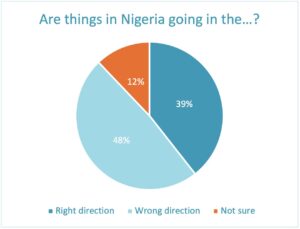
More than 2 out of 3 respondents (67%) aged 36 and older believe the country is going in the wrong direction.
The perceived trajectory of the country has most feeling “frustrated” with the current situation (58%). This holds true across gender and age groups.
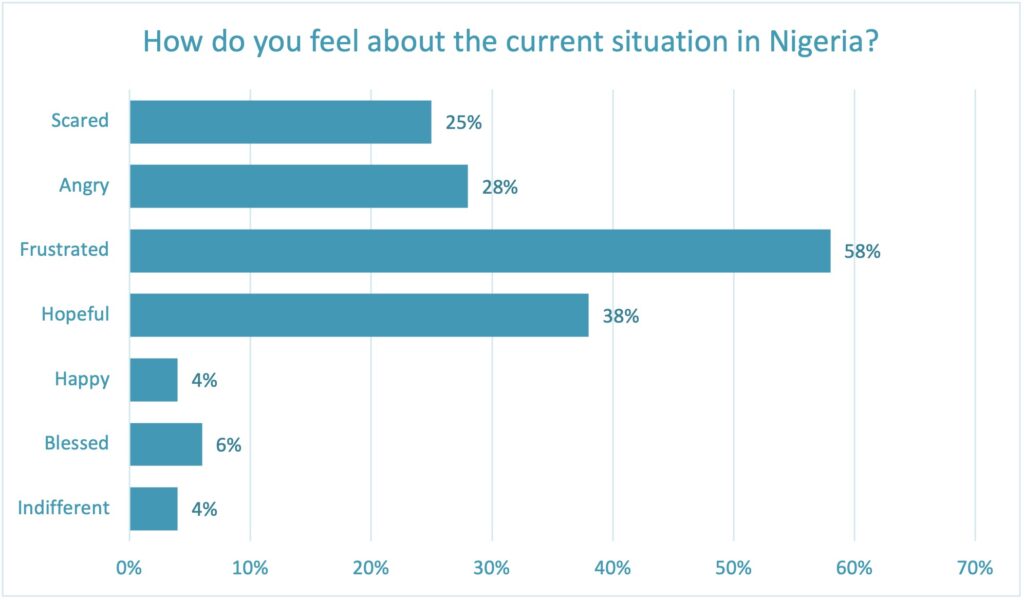
Although frustration is the leading public sentiment right now, “hopeful” is second at 38%, illustrating an at least somewhat positive outlook. Further, when asked directly about the future of Nigeria, 69% of respondents say they think it will get “better” compared to only 12% that believe it will get worse.
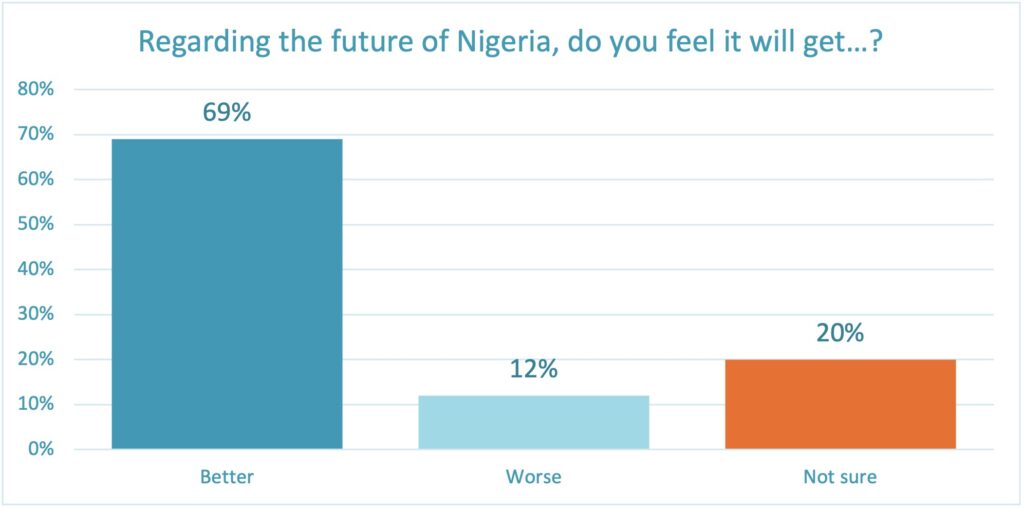
In order for Nigeria to move forward, however, respondents say the country must first deal with widespread “corruption.”
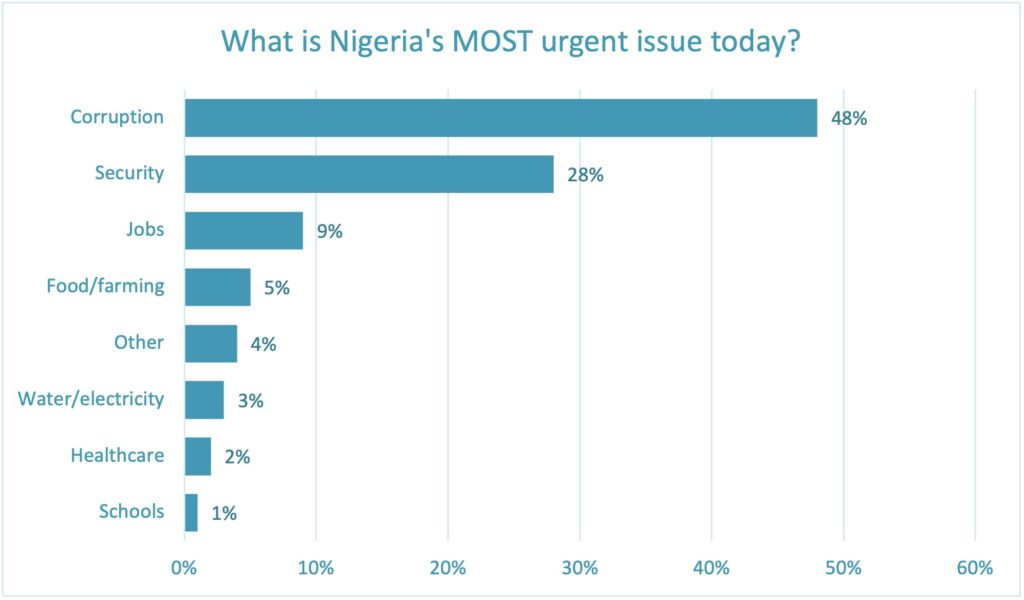
More than 1 in 4 respondents view “security” as the biggest challenge to peace and stability in Nigeria (28%).
Access to Election News and Information
Nigerians are paying close attention as they prepare to vote in what has become a highly contentious election. In our study, almost all respondents say they are following information about the election at least daily (89%).
89% say they are following information about the election at least daily
 Some feel unsatisfied with the information they are getting, however. Only 62% say they are able to access all the true and accurate information about the election that they need.
Some feel unsatisfied with the information they are getting, however. Only 62% say they are able to access all the true and accurate information about the election that they need.
Disinformation is clearly a concern. More than 9 out of 10 respondents (94%) suspect at least “a little” of the information they have seen or heard about the election to be false or inaccurate.
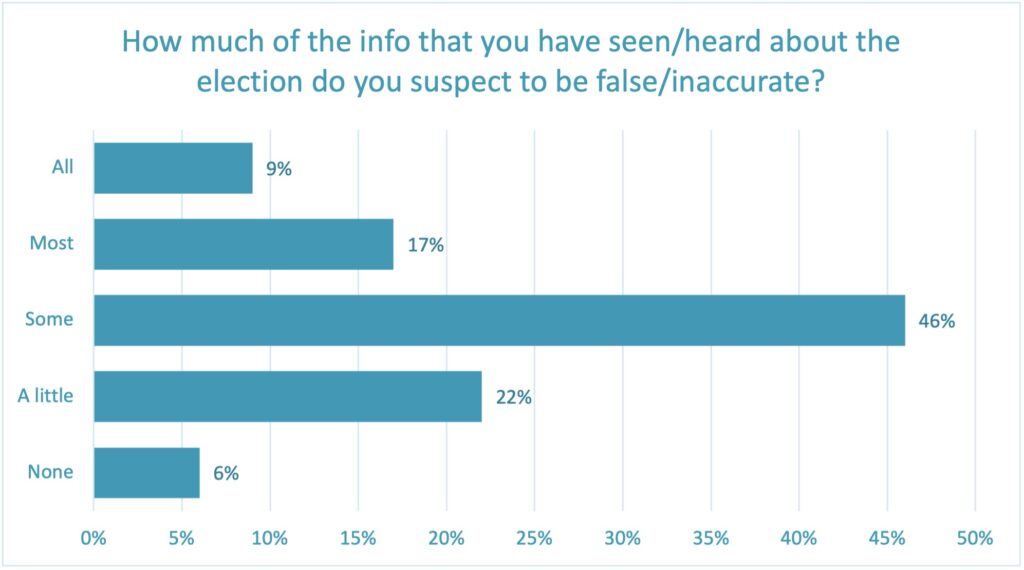
In January 2023, a BBC investigation concluded that political parties and supporters in Nigeria were illegally paying social media influencers to spread disinformation about their opponents in the upcoming election. Recent reports in The Guardian also uncovered disinformation tactics used to manipulate the results in Nigeria’s 2015 election.
Voting Intentions
Public interest and engagement in the upcoming election is illustrated in the fact that 86% of respondents say they have registered to vote.
86% say they have a Permanent Voter’s Card (PVC)
Voter turnout in Nigeria has been on a steady decline over the past 20 years. The political parties and candidates have been working hard during this election cycle to reverse those trends, but concerns about turnout remain. Despite the 86% of respondents that say they have registered to vote and the 65% that claim they are “very likely” to vote, the percentage of people that actually show up on election day to cast their ballot will likely fall far below those lofty claims.
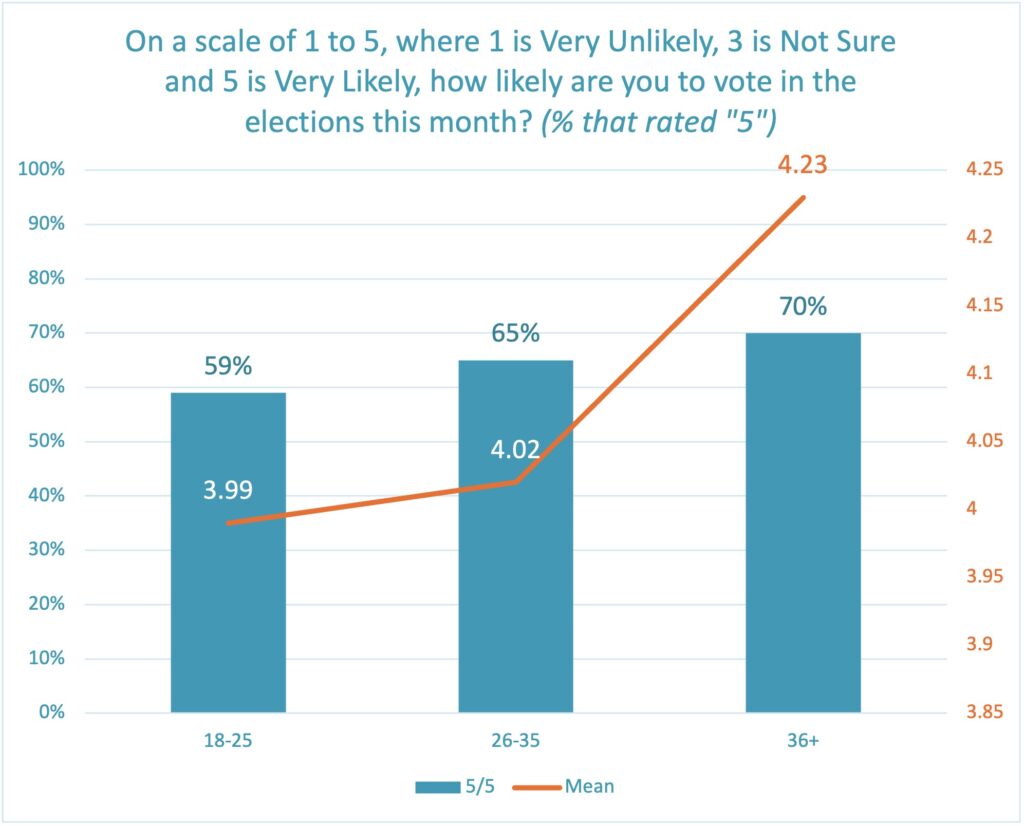
Likelihood to vote increases with age. Those saying they are “very likely” to vote ranges from 59% for respondents aged 18-25 to 70% for respondents aged 36 and older. The mean scores range from 3.99 to 4.23 on a 5-point scale.
Regardless of age group, the largest segment of respondents (71%) says their choice for President will be based on “competence.” “Trust” and a “clear manifesto” are also important considerations for most.
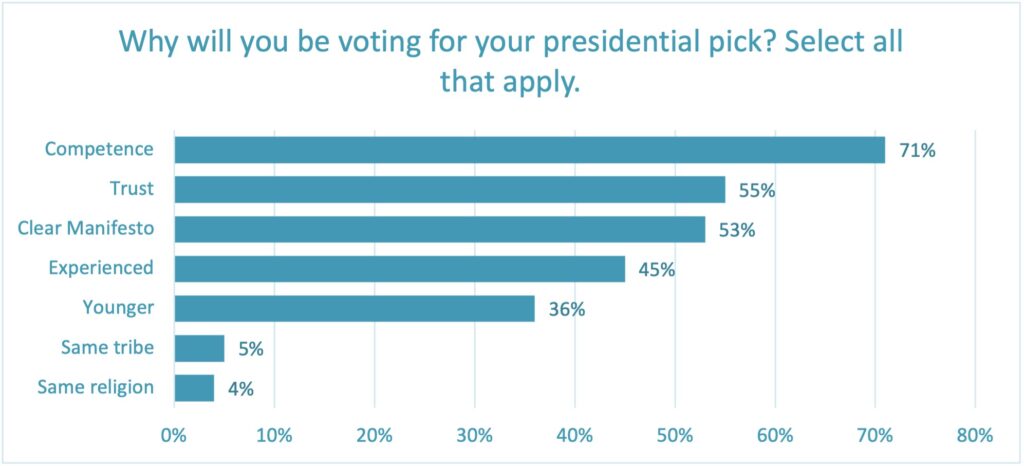
Trust in the Electoral Process
Trust in the electoral process is critical for reducing voter apathy and increasing turnout. Following credible reports in previous elections of ballot stuffing and paying for votes, the Independent National Electoral Commission (INEC) says it has implemented technologies and other measures to help ensure that this election is free from fraud and corruption.
To assess voting-age Nigerians’ perceptions of the electoral process in the week leading up to the election, we presented them a series of statements related to the process and asked whether they agree or disagree with each statement.
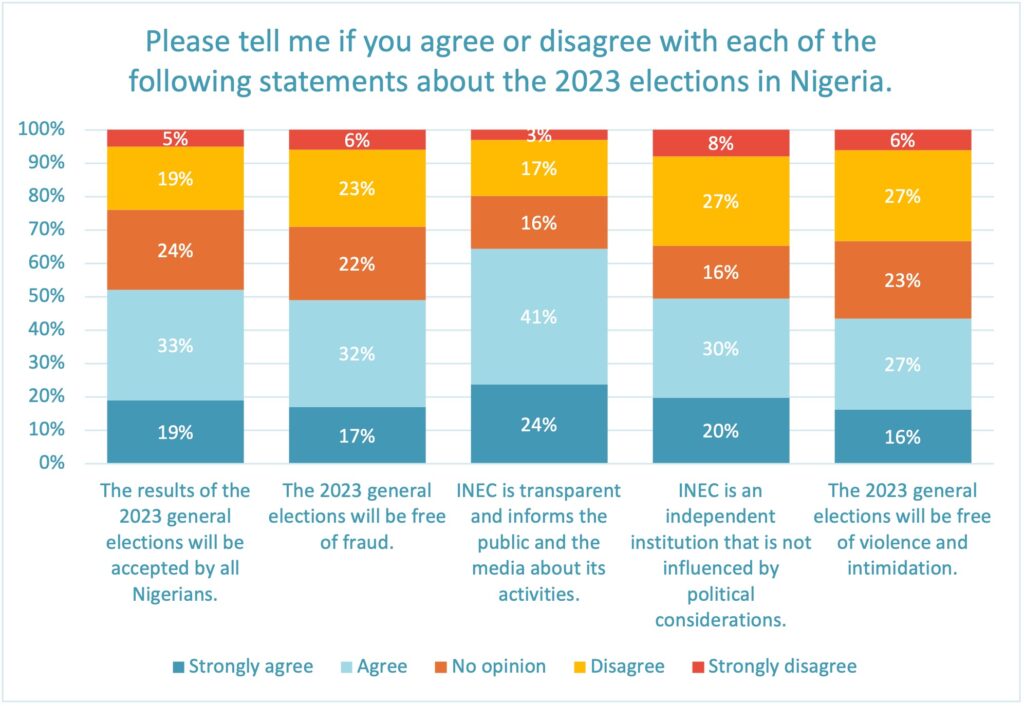
More than half of respondents (52%) believe in the electoral process enough to agree or strongly agree that the results of the 2023 elections will be accepted by all Nigerians. Only 5% strongly disagree.
Almost half (49%) agree or strongly agree that the elections will be free of fraud. That percentage drops to 40% for respondents aged 18-25. Men express more trust in a fraud-free election than women (51% to 43%).
Although almost 2 in 3 respondents agree or strongly agree that INEC is transparent and informs the public and media about its activities (65%), significantly less believe INEC is an independent institution and not is not influenced by political considerations (50%).
With reports of INEC offices being attacked in the months leading up to the election, only 43% of respondents agree or strongly agree that the elections will be free of violence and intimidation.
Overall, more than 2 in 3 respondents (67%) express at least “a fair amount” of confidence in the ability of INEC to organize credible elections.
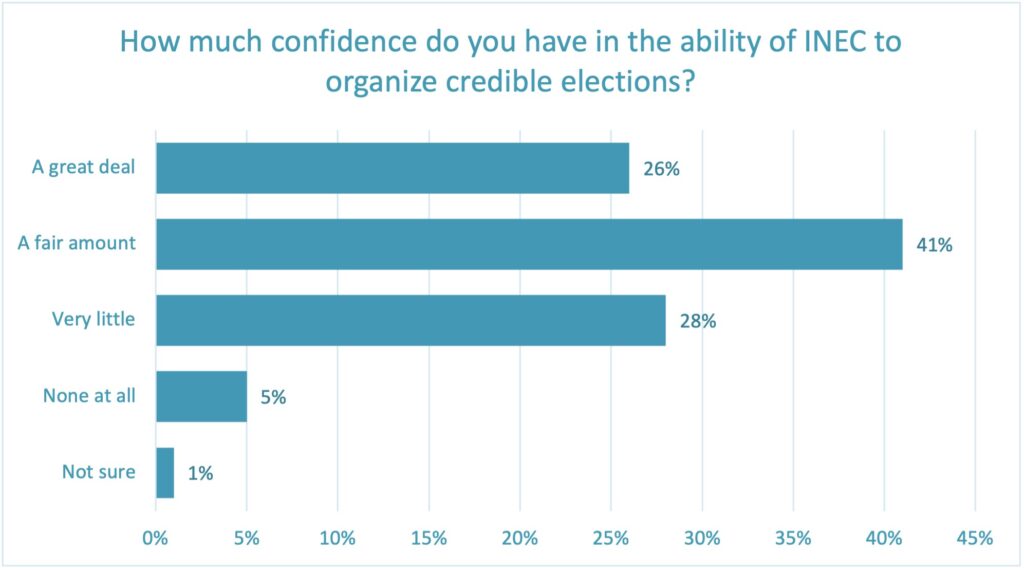
Interactive Data Dashboard
Dive deeper into GeoPoll’s data on the Nigeria elections using the interactive dashboard below. The dashboard provides responses to each question in the survey, filterable by state, age group, and gender.
Conduct Multi-modal Research with GeoPoll
GeoPoll is a full-service market and social research agency that conducts surveys via computer-assisted telephone interviewing (CATI), computer-assisted personal interviewing (CAPI), short message service (SMS), WhatsApp, and mobile web/mobile application communications. We also conduct online and offline qualitative research.
This study was implemented by GeoPoll using our own mobile research platform. The questionnaire was designed by GeoPoll researchers and conducted via SMS and mobile web technology. Data collection occurred from February 14-18, 2023. The diverse sample includes a gender composition of 33% females and 67% males, an age breakdown of 22% aged 18-25, 45% aged 26-35, and 33% aged 36 and over, and representation from every state (ADM1) in Nigeria.
For more information on the sample and methodology for this study or to conduct a research study of your own using our multi-modal research platform, contact us today.
